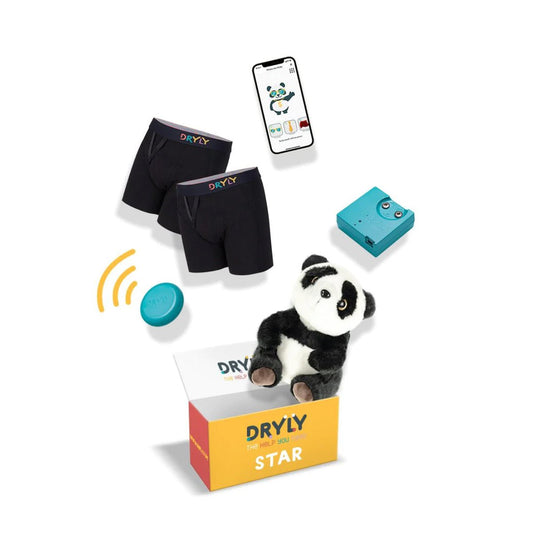Does your child often wake up to pee during the night? Or does he or she even still wet the bed? Frequent nighttime urination is very common in children and is nothing to be ashamed of at all! As a parent you want nothing more than for your child to feel comfortable, sleep well and feel confident to start the day.
In this blog you will read what is really behind nighttime urination, why it happens and more importantly, what you can do to help your child towards dry nights so that your child can feel confident again in life!
What does it mean when a child urinates frequently at night?
When a child urinates frequently at night whether this happens in bed or by waking up to go to the toilet, we speak of nocturnal enuresia or nycturnia.
In young children, this is normal to some extent. But if it persists after the potty training phase or suddenly recurs, it is good to look further. This often has more impact than thought for your child and family:
- Your child becomes tired and irritable
- Your child's self-confidence can suffer
- As a parent, you sleep worried or stressed out
- Tension arises around bedtime
Important to remember as a parent: your child is not doing this on purpose. And you are not alone.
Causes, why does my child urinate so often at night?
1. The bladder is still developing
Many children do not feel the urge at night very well, or their bladder is still too small. This causes a full bladder more quickly during the night.
2. Drinking too much (or wrongly) in the evening
Soft drinks, milk or lemonade in the evening hours can give the bladder an extra stimulation. Make sure your child drinks enough during the day, but limit it after dinner.
3. Deep sleepers
Some children sleep so deeply that they don't notice their full bladder. The brain simply does not get the signal in time so the accident has happened before the child realizes it.
4. Psychological factors
Stress, tension at school, a new baby in the house or a move can lead to nighttime urination. The bladder reacts strongly to emotional turmoil.
5. Heredity
Bedwetting and nighttime urination often runs in the family. If one parent had this as a child, the child is more likely to experience it as well.
Recognize patterns? Keep a pee diary!
A great way to gain insight into your child 's urination behavior is to keep a pee diary. In a pee diary, you can keep track of a number of things. These are how much your child drinks, when your child pees, whether your child wakes up dry or wet, and if there have been any stresses or changes in routine.
This allows you to see connections faster and take more focused action. This also helps if you want to call in a professional. The professional will also gain insight into your child's bedwetting behavior.
What really helps with frequent bedwetting at night?
There are a number of proven and fine options for your child to work on this. Below are a few options that we are certain can help your child work toward dry nights
- The bedwetting alarm
A Bedwetting Alarm is an effective and proven tool to help children wake up to a full bladder. The sensor detects the first drops of urine and triggers an alarm, teaching your child to wake up in time to go to the bathroom. This helps the body better recognize signals and speeds up the process toward dry nights as the signals between the brain and the bladder continue to develop.
Dryly has developed a kid-friendly and fun Bedwetting Alarm so your child can work towards dry nights in a positive way! Thus, on average, children are potty trained within 6 - 8 weeks with the Dryly Bedwetting Alarm method!
"Experience 💬⭐: We took the package with vibration function, after 6 days we had dry nights, now already three weeks dry, highly recommended!"
- Positive approach
Shame and punishment is counterproductive. Rather, opt for a positive approach: reward cards, compliments and, above all, patience are hugely important. Your child will feel safe and supported as a result.
- Optimize your sleep routine
A quiet evening routine helps a child relax better, consider the following aspects:
- No screens in the last hour before bedtime
- Quiet activities such as drawing or reading aloud
- Last toilet visit before bedtime
- No sugar or caffeine after 6 p.m.
Following these tips will give your child clarity and structure prior to the night and the least amount of stress. Small changes can have a big impact on a child.
- Bladder training during the day
Consciously allow your child to wait a little longer to pee during the day (within limits, of course). This helps train the bladder to hold more volume, which ;can make all the difference at night.
Unique approach, discuss it with your child but on their level
What most parents don't do (and what really helps): talk to your child about what's happening. But not in a pedantic way. For example, use age-appropriate stories or metaphors like the following example:
''Your bladder is a bit like a balloon. Sometimes you have to learn to feel when it's almost full so you can empty it in time before it pops.''
So also let your child contribute to the solution: choosing a bed sheet, keeping a reward schedule or setting an alarm clock. Together, make the problem something you can work on together! This will also give the child more motivation to solve it.
Frequently urinating at night? A phase, not a failure
Whether your child wets every night or makes it to the toilet just in time, frequent nighttime urination is usually a phase. But a phase that deserves attention. Not with shame or frustration, but with love, patience, structure and the right tools.
So children who urinate often at night do not have a behavioral problem, they need help recognizing signs, building self-confidence and developing a healthy sleep routine.
At Dryly, we believe that every night can be a step toward success. The Dryly Bedwetting alarm is designed to take these steps together.
Want to know more?
Check out our Bedwetting Alarm and help your child towards dry, peaceful nights!




